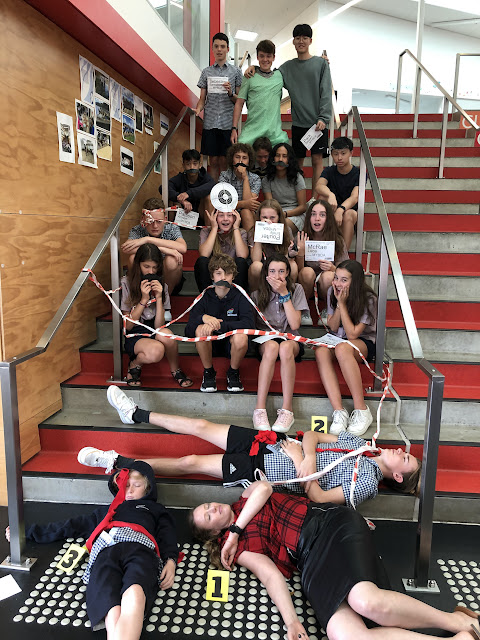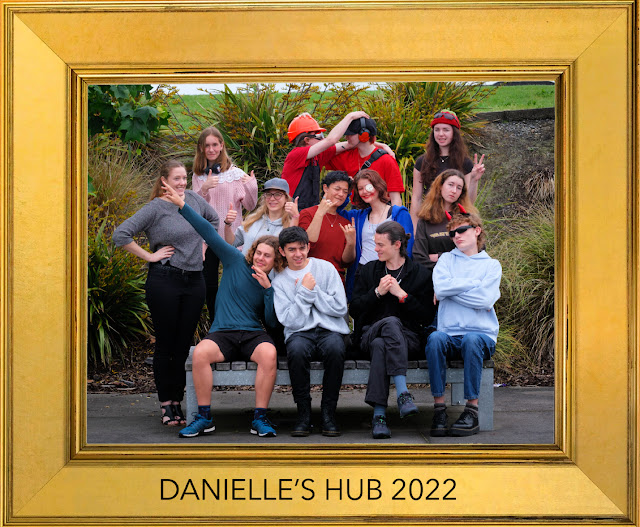October of this year marked my 10 year anniversary at Hobsonville Point Secondary School (HPSS) where I started as a foundation staff member. Much has changed since those early days before we had any students and we dreamed up a school that would be better at meeting student needs. A lot will keep changing, particularly with an all-new senior leadership now at the helm in 2024. With so much change on the horizon, I have found myself thinking a lot about the areas of our school where I am reluctant to see major change, as well as the areas in our school where I would like to see more change.
One area that I hope will stay strong in our school as we go forward is Learning Hubs. Learning Hubs are our pastoral care system at HPSS, replacing the role of form teacher. While we do all the admin things a form teacher might do, we also have extra time with our learning hub students so that we have time to develop life skills such as self-reflection, leadership, emotional intelligence, etc.
Daniells' Donkeys - My Learning Hub
Without a doubt, being a hub coach is one of the most rewarding aspects of my job. Students keep the same hub and hub coach for their entire time at our school. This means that I see these students at the start of every day. Over time, this allows us to build really strong relationships where students and their parents trust us to discuss challenges in their education. Over the years this has involved supporting students and their families with everything from academic goals, behaviour expectations, bullies, gender transitions, parents with terminal illness, disabilities, etc. When families trust us, they are able to be much more transparent with us about the support that young people need. And as a result, we can meet their needs much more effectively.
One of the aspects of my practice that I am really proud of is how I am able to help my hublings develop as a hub family. We know that when students experience a sense of belonging, they are more likely to succeed at school. Hence, I work very hard to create a sense of belonging for my students. This is done through lots of things but in particular:
- CHECK-INS: For a check-in, we sit in a circle. Each student answers a question about themselves. For example, what was the best part of your weekend, in what class are you having a lot of success right now, etc. There are a few reasons why I have embraced this practice so thoroughly including:
- Ensuring that every student has had an adult and their peers listen to them, everyday. How can any student feel like they belong if they can go through an entire day without anyone actually talking to them?
- Ensures that the hub group members hear what is going on for their peers. This allows them to make connections with each other and build their relationship with each other.
- Doing this regularly means that I can stay connected to my students and what is going on for them in an effective way.
- THANKFUL THURSDAYS: If you are not familiar with the neuroscience of gratitude, I suggest it is time you get caught up. Every Thursday morning during hub time, we each get a chance to share some of the things we are grateful for that week. This helps students start their day in a better frame of mind, while also giving me a little insight about what is on top for the students.
- TRADITIONS: Few things make a person feel like they belong as much as being part of a tradition. For our hub, we have had a long tradition of playing werewolf. Our older students enjoy teaching the new ones and the young students enjoy having fun with the older kids. Other traditions in my hub include silly photos, and can collections for the annual can drive. We are working on some more traditions however these are best when co-created with students.
- LEARNING GAMES: There are lots of learning benefits to games, and this becomes particularly evident in hub. Over the years I have created many games for my hublings. Sometimes it is something like Whanaungtanga eels and ladders that help students learn and make connections with each other. Other times it might be role-playing games that help them learn about career pathways. I've made games to help them develop critical thinking and games to help them with their communication skills. The great thing about using games for learning in a hub context is that as well as students learning and practising new skills, the games also help create shared memories that contribute to the students' sense of belonging and engagement.
Another aspect of Learning Hubs that I feel is really successful is the academic coaching. Sometimes in school students who just get on and do the work rarely ever get one-on-one attention. We also have students who with the right encouragement could do much better. We have students who struggle to make sense of their work and those who need more challenge. The benefit of hubs and keeping them relatively small is that we can have fairly regular conversations with every student individually about how they are going in their learning, what the challenges the are encountering, and what needs to be done about this. I believe that learning hubs are a key aspect of what allows us to have high expectations of our students at HPSS.
While academic coaching conversations can be helpful in communicating high expectations, it can also be helpful in helping identify where students need additional support. One area where this is often the case is advocating for students, particularly those with disabilities. As a learning coach, I have spent a great amount of time ensuring that students are getting the support that they need. More often than not, the areas where students needed support or someone to champion them were identified through a one-on-one coaching conversation.
In summary, hub is one of the areas in my practice where I feel that I get the balance of warm and demanding right. There are systems and structures in place that allow an inclusive approach where every student has their own pathway, yet enable us to have high expectations of every student.
Where to next?
As our hubs have students from year 9 to year 13, every year we have new students who join our hubs. As a result, every year we need to bring new students on board into our hub and help them feel just as included. Hence, every year my 'where to next' is focussed on how I might continue to develop the warm and demanding in hub to extend to new students.



